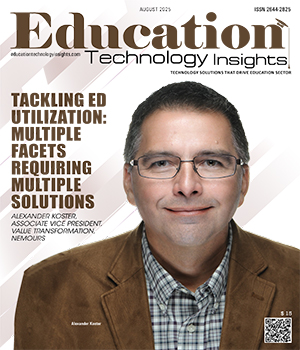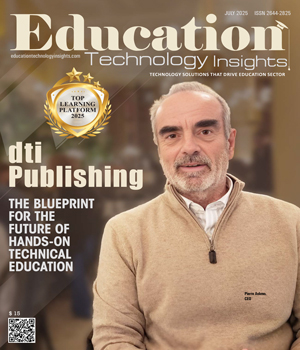THANK YOU FOR SUBSCRIBING
Be first to read the latest tech news, Industry Leader's Insights, and CIO interviews of medium and large enterprises exclusively from Education Technology Insights
Navigating AI Trends in Educational Technology
Jean Mandernach, Executive Director, Center for Innovation in Research and Teaching, Grand Canyon University
 Jean Mandernach, Executive Director, Center for Innovation in Research and Teaching, Grand Canyon University
Jean Mandernach, Executive Director, Center for Innovation in Research and Teaching, Grand Canyon UniversityThrough this article, Jean Mandernach explores how Generative Artificial Intelligence (GenAI) reshapes higher education by challenging traditional teaching and learning practices. She argues that while AI simplifies content creation and grading, it also risks reducing education to a mechanical process. Instead, Mandernach advocates using AI to free up faculty time for deeper, more meaningful student interactions. She emphasizes the potential for AI to enhance personalized learning experiences and foster a more human-centric educational environment
Generative Artificial Intelligence (GenAI) is fundamentally transforming higher education. For the first time in history, students can access and produce information at the touch of a button. This revolution is not only altering how information is found and utilized but is also challenging the traditional practices that underpin higher education. The role of faculty as primary information providers and the outdated measurement of learning via mere memorization, repetition and synthesis of information is being reevaluated as these tasks can easily be implemented via AI. With AI handling these functions, our traditional assumptions about teaching and learning are poised for a significant shift.
Students and instructors can generate content using simple AI prompts in this era. Students can complete assignments and instructors can provide individualized feedback with unprecedented ease. This convenience, however, comes with a significant risk: education may devolve into a mechanical transaction between AI applications, stripping away the human elements that make learning a profound and personal experience.
“AI offers a transformative opportunity to humanize education, shifting the focus from content delivery to deeper, more meaningful student engagement”
Many faculty members are responding to this emerging pattern by attempting to restrict AI use. They are implementing AI detectors to scan student work and designing AI-proof assignments. While these measures aim to preserve academic integrity, they might be counterproductive and overlook a unique opportunity that AI presents. Instead of doubling down on AI prevention, educators should seize the chance to redefine their roles from content providers and graders to intellectual mentors who engage with students on a deeper level.
In the AI age, we have a unique opportunity to reshape our fundamental views of higher education, allowing faculty to truly and meaningfully engage with students. Freed from the burdens of content delivery and grading, instructors can embrace AI to provide customized educational content and feedback, which liberates their time to engage students about complex concepts, theories and applications within their disciplines.
Imagine a classroom where faculty no longer spend hours delivering lectures and grading papers. Instead, they could use AI to handle these tasks, freeing them up to have more personal interactions with students. Faculty could host in-depth discussions, lead exploratory projects, and mentor students through intricate problems that require human insight and empathy. This approach humanizes the educational process and enhances the overall learning experience, making it richer and more fulfilling.
Students and faculty can benefit from embracing AI as a powerful learning tool. By leveraging AI for routine tasks, they can create more time for intentional and meaningful interactions. Faculty can challenge themselves to think about how they would explore their content differently, knowing that students can gain and demonstrate basic knowledge through AI interactions. This shift allows faculty to invest their time in nurturing relationships with students, fostering a learning environment that is uniquely human and intellectually stimulating.
To aid faculty in envisioning how AI can reshape their teaching practices, reflecting on the following questions can be particularly impactful:
• How can I use AI to automate routine tasks such as grading and content delivery to free up more time for meaningful student engagement?
• In what ways can AI tools help personalize the learning experience for each student based on their individual needs and learning styles?
• How can I foster community and student collaboration in an AI-enhanced learning environment?
• How can I empower my students to use AI tools effectively and ethically to enhance their learning and research skills?
• What innovative teaching strategies can I explore that integrate AI to foster deeper learning and engagement?
By considering these questions, faculty can leverage AI to enhance their teaching practices and create a more dynamic and personalized educational experience.
Rather than viewing AI as a threat, the advent of AI in education offers a transformative opportunity. It prompts a paradigm shift in how we perceive and practice teaching and learning. By humanizing education and embracing AI as a tool for enhancing rather than replacing human interaction, we can create more engaging, personalized and meaningful educational experiences.
Read Also
Our AI Crisis isn't Technical. It's Human.
4 Keys to Managing Change
Active Engagement is the Foundation of Effective Leadership
Empowering Leadership through Innovation in Higher Education
The New Era of Education
Redefining Readiness: A Path Toward a Technology-Agnostic Future

I agree We use cookies on this website to enhance your user experience. By clicking any link on this page you are giving your consent for us to set cookies. More info






















